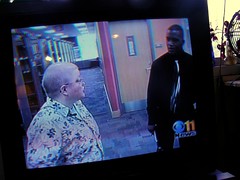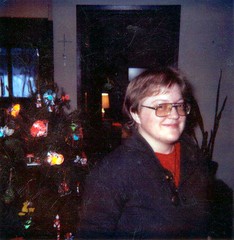The primary reason Channel 11 wanted to interview me today was because they were interested in hearing from people who had experienced discrimination in Anchorage because of sexual orientation. I know that the folks at Equality Works have been collecting accounts of discrimination this year.
Back in 1987-1988, I worked with Jay Brause (coauthor) and Jacqueline Buckley (co-project coordinator) to put together the study Identity Reports: Sexual Orientation Bias in Alaska (Anchorage, AK: Identity, Inc., 1989). One section of the report, “Prima Facie: Documented Cases of Sexual Orientation Bias in Alaska,” gathered 84 accounts of discrimination & bias that had occurred in various parts of the state from 1974 to 1987. Some were based on documentary evidence — newspaper reports, court documents, letters, etc. — & others were based on taped interviews conducted mainly by Jackie, which I wrote up (along with the introductory methodology & analysis of the study).
It’s in part because of “Prima Facie” that I know the exact date when the incident of discrimination that Corey Allen-Young interviewed me about occurred: July 22, 1984. As my case appeared in the study (page 50 of Identity Reports), names & even the name of the bookstore I worked for were omitted. It was headlined:
Female, 25
* 31 – EMPLOYMENT DISCRIMINATION (RETAIL BOOKSTORE) July 22, 1984
The 31 refers to my story’s case number within the body of the report. The asterisk * refers to the fact that my case, evaluated by a former intake investigator with the Alaska Human Rights Commission, would in her opinion have been jurisdictional if the state human rights statute of the time, Alaska Statute 18.80, had been amended to extend protection against discrimination on the basis of sexual orientation. That is, had sexual orientation been a protected class like race, ethnicity, sex, religious affiliation, national origin, etc., I would have had grounds to file a complaint with the state human rights commission & seek redress. (Like maybe getting my job back.)
But sexual orientation was not a protected class under Alaska Statutes. Nor was it under federal legislation, nor under municipal ordinance. I was, as they say, S.O.L.
If you want, you can look up Identity Reports in the library & find my case on page 50, case #31. I can vouch for the fact that there are a couple of copies of it in the Alaskana section on the second floor of the UAA/APU Consortium Library, because I pulled a copy of it (& of an earlier study I’d also worked on, One in 10: A profile of Alaska’s Lesbian & Gay Community, 1986) to show to Corey when he came to interview me. (And to Channel 11 cameraman Scott Favorite.) But the account as written there is kinda dry. Like I said, doesn’t even include the name of the bookstore I was working at.
I gave a pretty complete account to Corey & Scott, names included. But of course an interview which is only one part of a two-and-a-half-minute story on a nightly TV news program has to edit things down somewhat. Here’s what KTVA’s written version of the story says (following closely what was said in the broadcast):
For Melissa being discriminated for her sexual orientation began here in 1984. “One day I just walked into work and my manager said we are going to have to fire you and I was like what why.” Melissa says she was fired over complaints that she was not helpful enough. Something that was surprising due to her previous good work ethic. But she says that all changed when her supervisors learned of her sexual orientation. “Anyone that works for a book store, or any other private business can get fired exactly the same way that I did, for no other reason than one of my co workers disliked me.”
All in all, it fit in well with what I felt was a pretty good, balanced story on Channel 11’s news broadcast tonight. And Corey & Scott made it an interesting, enjoyable experience for me (even if I didn’t end up having time to eat my lunch!).
But here’s the full story:
In July 1984 I was a probationary employee at the Sears Mall store of the Book Cache, which many will remember as an Alaska-owned chain of bookstores that went defunct a few years later. One of my coworkers was another young woman, perhaps 19 or 20, named Chris, who used to spend a lot of her breaks & lunches hanging out with a gay male friend of hers who worked down the mall at Sears. Because of that friendship, I evaluated Chris as someone who could safely know that I was a lesbian — don’t remember exactly how the topic was brought up, but in any case she knew about me. She had no problem with it, was friendly throughout.
Problem, though: Chris had a habit of taking overlong breaks, which often cut into my own. This was especially a problem when my brother, who worked for the State of Alaska downtown, came to meet me for lunch: he had only so much time, & if Chris was late getting back, so much for me having lunch with my brother. I talked with Chris about it two or three times, but despite any promises she didn’t change her behavior. So finally I felt compelled to complain to my manager about it.
On July 22, 1984, after a couple of days off (& rough days they were, too, but that’s a story best told elsewhere), I came in to work & went to the workroom at the back of the store to take off my jacket. I wasn’t even able to get both arms out before my manager approached me & said, “I’m sorry, but we’re going to have to fire you.” I was dumbfounded. “Why?” I asked. She explained that two customers had complained to the personnel manager that I wasn’t “helpful enough.”
That didn’t make sense. After all, the personnel manager worked in a downtown office: he wasn’t even onsite. Whereas my manager was: surely if a customer had a complaint about me, they’d make it directly to her. Nor had I received any complaints or cautions whatsoever about my job performance to date. It occurred to me pretty quickly that at the very least, the action to fire me had not originated with my manager: her attitude was apologetic, as though she was perhaps against my being fired, & the explanation of the why seemed to foist responsibility onto the chief high muckety-mucks downtown, rather than her.
It also occurred to me to wonder if maybe I’d been fired for being a lesbian. This was confirmed a couple of days later when I went in to the store to pick up my final paycheck. I talked with one of my other (former) coworkers, whose name I don’t remember — in “Prima Facie” she goes by the initial M. M was maybe two or three years younger than me, a rather innocent-seeming Mormon girl who seemed embarrassed by what she had to tell me. She said that the day before I was fired, she had seen Chris at the back of the store talking with higher-ups from downtown, including the manager. On the same day, Chris had announced to coworkers that I was gay. On the day I was fired, Chris had gone about the store singing, “Mel got fired, Mel got fired.”
I’ve never seen Chris since, but my best guess is that she resented me for complaining to our manager about her habit of taking overlong breaks, & decided to get her revenge by playing on the prejudices of higher management.
And there was nothing I could do about it. My employers didn’t care that I was a good and conscientious worker. What was more important from their point of view, apparently, was that I was a member of a category of people against whom they were prejudiced, never mind that they had no clue I was a member of that category until Chris told them. Not only that, but they lacked the courage to tell the truth about why I was being fired to my face — though they must have known that, absent any legal protections from discrimination on the basis of sexual orientation, there was absolutely nothing I could do about it.
And you know, here it is, 25 years later, & we’ve got the very same situation in Anchorage today. Which is why I told Corey on Channel 11 News:
Anyone that works for a book store, or any other private business can get fired exactly the same way that I did, for no other reason than one of my co workers disliked me.
Let your representatives on the assembly that you want equal rights in Anchorage. Ask them to pass the proposed equal rights ordinance. And support Equality Works in their efforts to end discrimination in Anchorage on the basis of sexual orientation and gender identity.




Pingback: Share your Story of Discrimination | Bent Alaska